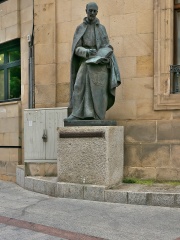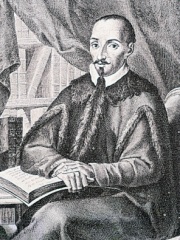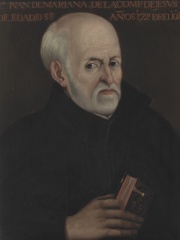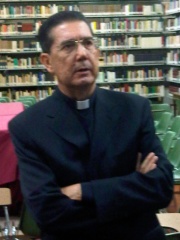





The Most Famous
HISTORIANS from Spain
This page contains a list of the greatest Spanish Historians. The pantheon dataset contains 561 Historians, 7 of which were born in Spain. This makes Spain the birth place of the 15th most number of Historians behind Iraq, and Netherlands.
Top 7
The following people are considered by Pantheon to be the most legendary Spanish Historians of all time. This list of famous Spanish Historians is sorted by HPI (Historical Popularity Index), a metric that aggregates information on a biography's online popularity.

1. Gonzalo Fernández de Oviedo y Valdés (1478 - 1557)
With an HPI of 60.79, Gonzalo Fernández de Oviedo y Valdés is the most famous Spanish Historian. His biography has been translated into 17 different languages on wikipedia.
Gonzalo Fernández de Oviedo y Valdés (August 1478 – 1557), commonly known as Oviedo, was a Spanish soldier, historian, writer, botanist and colonist. Oviedo participated in the Spanish colonization of the West Indies, arriving in the first few years after Christopher Columbus became the first European to arrive at the islands in 1492. Oviedo's chronicle Historia general de las Indias, published in 1535 to expand on his 1526 summary La Natural hystoria de las Indias (collectively reprinted, three centuries after his death, as Historia general y natural de las Indias), forms one of the few primary sources about it. Portions of the original text were widely read in the 16th century in Spanish, English, Italian and French editions, and introduced Europeans to the hammock, the pineapple, and tobacco as well as creating influential representations of the colonized peoples of the region.

2. Ibn Sa'id al-Maghribi (1213 - 1286)
With an HPI of 60.75, Ibn Sa'id al-Maghribi is the 2nd most famous Spanish Historian. His biography has been translated into 17 different languages.
Abū al-Ḥasan ʿAlī ibn Mūsā ibn Saʿīd al-Maghribī (Arabic: علي بن موسى المغربي بن سعيد) (1213–1286), also known as Ibn Saʿīd al-Andalusī, was an Arab geographer, historian, poet, and the most important collector of poetry from al-Andalus in the 12th and 13th centuries.

3. Francisco López de Gómara (1511 - 1566)
With an HPI of 60.56, Francisco López de Gómara is the 3rd most famous Spanish Historian. His biography has been translated into 17 different languages.
Francisco López de Gómara (February 2, 1511 – c. 1564) was a Spanish historian who worked in Seville, particularly noted for his works in which he described the early 16th century expedition undertaken by Hernán Cortés in the Spanish conquest of the New World. Although Gómara himself did not accompany Cortés, and had in fact never been to the Americas, he had firsthand access to Cortés and others of the returning conquistadores as the sources of his account. However other contemporaries, among them most notably Bernal Díaz del Castillo, criticised his work as being full of inaccuracies, and one which unjustifiably sanitised the events and aggrandised Cortés' role. As such, the reliability of his works may be called into question; yet they remain a valuable and oft-cited record of these events.

4. Ibn Hayyan (987 - 1076)
With an HPI of 60.53, Ibn Hayyan is the 4th most famous Spanish Historian. His biography has been translated into 19 different languages.
Abū Marwān Ḥayyān ibn Khalaf ibn Ḥusayn ibn Ḥayyān al-Andalusī al-Qurṭubī (Arabic: ابن حيَّان القرطبي) (987–1075), usually known as Ibn Hayyan, was an Arab Muslim historian from Al-Andalus. His work provides an early reference to Viking raiders, called Majus by him.

5. Miguel Ángel Ayuso Guixot (1952 - 2024)
With an HPI of 60.28, Miguel Ángel Ayuso Guixot is the 5th most famous Spanish Historian. His biography has been translated into 22 different languages.
Miguel Ángel Ayuso Guixot, MCCJ (17 June 1952 – 25 November 2024) was a Spanish prelate of the Catholic Church and a historian of Islam. He was an official of the Roman Curia since 2012 and an archbishop since 2016. Pope Francis raised him to the rank of cardinal on 5 October 2019, an office he held until his death in 2024.

6. Jerónimo Zurita y Castro (1512 - 1580)
With an HPI of 59.79, Jerónimo Zurita y Castro is the 6th most famous Spanish Historian. His biography has been translated into 16 different languages.
Jerónimo (or Gerónimo) de Zurita y Castro or simply Jerónimo (or Gerónimo) de Zurita (1512 – 3 November 1580) was a Spanish historian of the sixteenth century who founded the modern tradition of historical scholarship in Spain. Born at Zaragoza, Kingdom of Aragon, he studied at Alcalá de Henares under the Hellenist Hernán Nuñez. Through the influence of his father, Miguel de Zurita, physician to Charles V, Holy Roman Emperor, he entered the public service as magistrate at Barbastro, and in 1537 was appointed assistant-secretary of the Inquisition. In 1548 Zurita was nominated official chronicler of the Kingdom of Aragon, and in 1566 Philip II of Spain attached him as secretary to the council of the Inquisition, delegating to him the conduct of all matters sufficiently important to require the king's signature. Zurita resigned these posts on the January 21, 1571, obtained a sinecure at Zaragoza, and dedicated himself wholly to the composition of his Anales de la Corona de Aragón, the first part of which had appeared in 1562; he lived to see the last volume printed at Zaragoza on the April 22, 1580, and died on the November 3 following. Zurita's style is somewhat crabbed and dry, but his authority is unquestionable; he displayed a new conception of an historian's duties, and, not content with the ample materials stored in the Archives of Aragon, continued his researches in the libraries of Rome, Naples and Sicily.

7. Juan de Mariana (1536 - 1624)
With an HPI of 59.30, Juan de Mariana is the 7th most famous Spanish Historian. His biography has been translated into 16 different languages.
Juan de Mariana (2 April 1536 – 17 February 1624) was a Spanish Jesuit priest, Scholastic, historian, and member of the Monarchomachs.
People
Pantheon has 7 people classified as Spanish historians born between 987 and 1952. Of these 7, none of them are still alive today. The most famous deceased Spanish historians include Gonzalo Fernández de Oviedo y Valdés, Ibn Sa'id al-Maghribi, and Francisco López de Gómara.
Deceased Spanish Historians
Go to all RankingsGonzalo Fernández de Oviedo y Valdés
1478 - 1557
HPI: 60.79
Ibn Sa'id al-Maghribi
1213 - 1286
HPI: 60.75
Francisco López de Gómara
1511 - 1566
HPI: 60.56
Ibn Hayyan
987 - 1076
HPI: 60.53
Miguel Ángel Ayuso Guixot
1952 - 2024
HPI: 60.28
Jerónimo Zurita y Castro
1512 - 1580
HPI: 59.79
Juan de Mariana
1536 - 1624
HPI: 59.30

